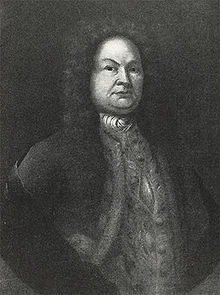Gunno Eurelius Dahlstierna
Gunno Eurelius Dahlstierna , also Dahlstjerna , (born September 7, 1661 in Örs / Dalsland as Gunno Eurelius ; † September 7, 1709 in Pomerania ) was a Swedish surveyor and late Baroque poet.
From 1691 to 1700, Eurelius was in charge of the Swedish land survey of Western Pomerania . He is best known in Swedish literary history for his Kunga-Skald .
Life
The son of the provost Andreas Eurelius and Maria Bluthera attended the grammar school in Karlstad and studied at Uppsala University from 1677 . From 1681 to 1685 he worked as a commission surveyor in Livonia , where he worked on the creation of a map of the province. He then turned down the offer of employment as a city engineer in Riga and initially went to sea for some time. After further training in navigation and marine mapping on the Baltic Sea , he went to Germany, where he studied at various universities. In 1687 he was awarded a master's degree in philosophy at the University of Leipzig .
The director of the Swedish surveyors, Carl Gripenhielm, summoned Eurelius in 1691 with nine other surveyors to Stockholm . There he passed an examination and was then appointed inspector of the Pomeranian Land Knife Commission. After a few delays, the surveyors crossed over to Swedish Pomerania under the leadership of Eurelius in the autumn and, from the following year, carried out the work carried out by King Charles XI. ordered land survey. In 1699 Eurelius was appointed director of the entire Swedish land survey in Stockholm. From 1700 to 1701 he reorganized the land surveyor's office and issued new work instructions and instructions. In order to start working on the matriculation system, he traveled back to Western Pomerania, where he lived in Stralsund , after having been appointed by a representative .
With the name Dahlstierna he was raised to the nobility in 1702. This was not only honored as a royal official, but also for his patriotic poetry and chants. His translations of the tragic comedy "Il pastor fido" and other poems by Giovanni Battista Guarini into Swedish date from between 1693 and 1697 , using the German translation by Christian Hoffmann von Hoffmannswaldau as a template for "Il pastor fido" . With his monumental poem "Kunga-Skald" (1697), an elegy on the death of Charles XI., He introduced the Ottaverime into Swedish poetry. An edition of Dahlstierna's poems was published between 1920 and 1928 by Erik Noreen under the title "Samlade Dikter".
family
Gunno Eurelius married Anna Schlomann (1679–1720) in 1699, the widow of Stralsund's mayor Gottfried Pyl (1641–1698). He had a daughter and three sons with her. The house that his wife had brought into the marriage soon had to be sold because his salary was not paid for a long time. Gunno Dahlstierna died in 1709 and was buried in the grave of Gottfried Pyl in the Nikolaikirche . In 1741 the outstanding salary was paid to his sons. His descendants owned various estates on Rügen and near Franzburg . In 1810 the bankruptcy of a bull in Stralsund was put on record. In the first half of the 19th century the noble family Dahlstierna died out.
literature
- Dahlstierna, Gunno . In: Bernhard Meijer, Theodor Westrin (ed.): Nordisk familjebok konversationslexikon och realencyklopedi . 2nd Edition. tape 5 : Cestius-Degas . Nordisk familjeboks förlag, Stockholm 1906, Sp. 1109 (Swedish, runeberg.org ).
- Carl Drolshagen : The Swedish land register and Hufenmatrikel of Western Pomerania as the oldest German land registry. Volume 2. von Bruncken, Greifswald 1923, pp. 216–226. Quoted in Michael Thiergart: Sumpors, blåaßwádert och fulwäxna pigor - Edition and linguistic analysis of early Swedish manuscripts . (PDF; 1.2 MB) Greifswald 2001, pp. 469-470
- Dahlstjerna, Gunno . In: Encyclopædia Britannica . 11th edition. tape 7 : Constantine Pavlovich - Demidov . London 1910, p. 734 (English, full text [ Wikisource ]).
Web links
- Literature by and about Gunno Eurelius Dahlstierna in the catalog of the German National Library
- Publications by and about Gunno Eurelius Dahlstierna in VD 17 .
- Literature about Gunno Eurelius Dahlstierna in the Landesbibliographie MV
- Writings by Gunno Eurelius Dahlstierna in the joint union catalog
Individual evidence
- ↑ Dahlstjerna . In: Heinrich August Pierer , Julius Löbe (Hrsg.): Universal Lexicon of the Present and the Past . 4th edition. tape 4 . Altenburg 1858, p. 647 ( zeno.org ).
- Walter Baumgartner (Ed.): Baltic Sea Baroque. LIT Verlag, Berlin / Hamburg / Münster 2006, ISBN 3-8258-9987-X :
- ^ Walter Baumgartner: German and Swedish wedding and mourning poems in Stralsund. A case study. P. 116.
- ^ Walter Baumgartner: German and Swedish wedding and mourning poems in Stralsund. A case study. Pp. 132-133.
| personal data | |
|---|---|
| SURNAME | Dahlstierna, Gunno Eurelius |
| ALTERNATIVE NAMES | Dahlstierna, Gunno; Dahlstjerna, Gunno; Eurelius, Gunno |
| BRIEF DESCRIPTION | Swedish surveyor and late Baroque poet |
| DATE OF BIRTH | September 7, 1661 |
| PLACE OF BIRTH | Örs, Dalsland |
| DATE OF DEATH | September 7, 1709 |
| Place of death | Pomerania |
